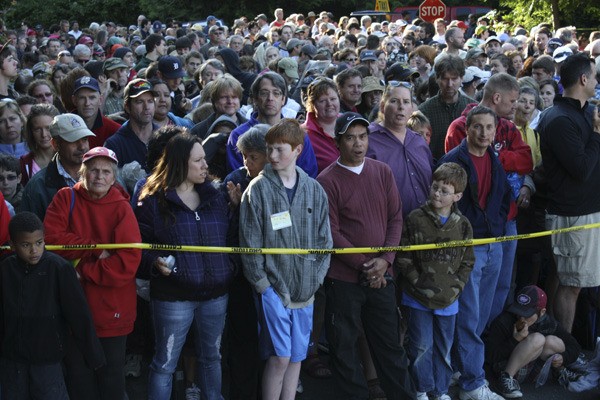The 2011 Rotary Auction increased its proceeds from last year by $25,000 as its organizers continued to fine-tune the orchestration of one of the country’s largest rummage sales.
The money is still being counted, but this year’s preliminary total is $366,435, which is up $25,000 from 2010.
Organizers made cutting back expenses a primary goal for the 2011 sale, but with more than 100,000 items to sort, clean and price, and overhead for staff, security, advertising, recycling and volunteers there was no shortage of work to be done.
“We are just trying to save every dollar we can because that’s the whole purpose – to give the money back to the community,” said Rotarian Marit Saltrones. “[Sales] leveled off the last few years and our costs keep going up so we had to cut back on our expenses. We aren’t making as much as we used to.”
Cost-cutting measures included long-term investments, such as purchasing $600 worth of two-way radios instead of renting them at a cost of $1,000 year after year. Now Rotary will rent them to other local organizations to use during their major events throughout the year. Savings were made in many of the event’s departments, including looking for discounts or used items when printers or other items needed replacement.
Unsold items also had begun to turn into an increasingly large budget item in recent years, according to Joanne Ellis, who has been in charge of the event’s recycling operation.
“It used to be easy because you threw everything in the disposal units and it ended up in the landfill,” said Ellis. “Now it’s a big deal. We have 12 people sorting through all the junk and we save nearly everything except hazardous materials.”
Now Rotary works with Green Planet, an entrepreneurial nonprofit that handles items such as televisions, computer monitors and refrigeration with freon – items that can be costly and sensitive to scrap. Green Planet also takes metals and electrical cords.
“Metals have become more valuable and that became clear because we had more people contacting us about them,” said Ellis.
Rotary makes a small amount of money from the metals it sells to Bainbridge Disposal, but Ellis said there is enough of a profit margin in metals that people call to see how they can collect it and take it home to make their own profit.
Another way the Rotary keeps unwanted items out of the dump. Saltrones said, is to give them away to various local businesses. This year, a record 42 charities and nonprofits collected the unsold items after the sale.
Some of the free goodies included: 32 boxes of commercial vases delivered to two island florist shops; three truckloads of plastic bags delivered to Town & Country Market for recycling; a women’s shelter received 26 boxes of personal and grooming items; 300 pounds of old mismatched, dirty running shoes were donated to a recycling project; keys from 100 computer keyboards will be used by a women’s prison art project; and broken candles were donated to Salish Sea Expeditions to be turned into fire starters.
Saltrones said that improving safety has also become a priority.
A safety department was created for volunteers to do safety checks for stray power cords or monitoring heavy stacking and lifting. Organizers moved the starting line so the racing shoppers would be closer to the goods, and hopefully reduce the repercussions of a fallen shopper at the start of the sale.
For shoppers already eager to plan next year’s outing, mark your calendar for the last Saturday in June. With over 1,000 volunteers and months of planning every year, the sale is a marquee event on many island calendars.
“Raising these funds simply could not happen without the generosity of the Bainbridge community and the selfless dedication of hundreds and hundreds of volunteers,” said Larry Smith, the 2011 auction chair. “It’s a dedication that seeks no reward or recognition and is priceless.”



